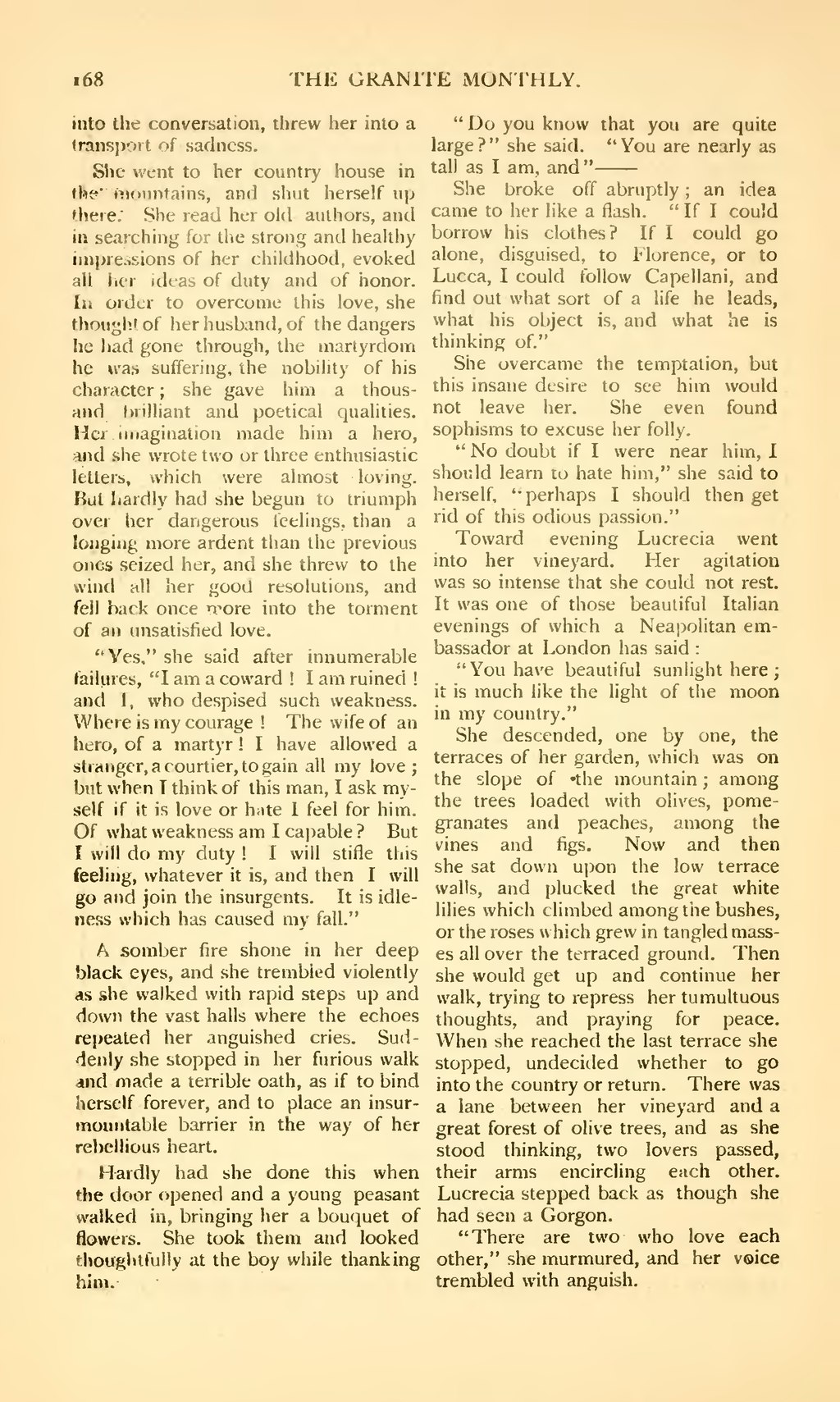i68
��THE GRANITE MONTHLY.
��into the conversation, threw her into a f ram;; vii | of sadness.
She went to her country house in tfcd" mountains, and shut herself up there." She read her old authors, and in searching for the strong and healthy impressions of her childhood, evoked ali her ideas of duty and of honor. In order to overcome this love, she thought of her husband, of the dangers he had gone through, the martyrdom he was suffering, the nobility of his character ; she gave him a thous- and brilliant and poetical qualities. Her imagination made him a hero, and she wrote two or three enthusiastic letters, which were almost loving. But hardly had she begun to triumph over her dangerous feelings, than a longing more ardent than the previous ones seized her, and she threw to the wind all her good resolutions, and fell back once more into the torment of an unsatisfied love.
"Yes," she said after innumerable failures, "I am a coward ! I am ruined ! and 1, who despised such weakness. Where is my courage ! The wife of an hero, of a martyr ! I have allowed a stranger, a courtier, to gain all my love; but when I think of this man, I ask my- self if it is love or hate I feel for him. Of what weakness am I capable? But I will do my duty ! I will stifle this feeling, whatever it is, and then I will go and join the insurgents. It is idle- ness which has caused my fall."
A somber fire shone in her deep black eyes, and she trembled violently as she walked with rapid steps up and down the vast halls where the echoes repeated her anguished cries. Sud- denly she stopped in her furious walk and made a terrible oath, as if to bind herself forever, and to place an insur- mountable barrier in the way of her rebellious heart.
Hardly had she done this when the door opened and a young peasant walked in, bringing her a bouquet of flowers. She took them and looked thoughtfully at the boy while thanking him.
��" Do you know that you are quite large?" she said. "You are nearly as tall as I am, and "
She broke off abruptly ; an idea came to her like a flash. "If I could borrow his clothes? If I could go alone, disguised, to Florence, or to Lucca, I could follow Capellani, and find out what sort of a life he leads, what his object is, and what he is thinking of."
She overcame the temptation, but this insane desire to see him would not leave her. She even found sophisms to excuse her folly.
" No doubt if I were near him, I should learn to hate him," she said to herself, "perhaps I should then get rid of this odious passion."
Toward evening Lucrecia went into her vineyard. Her agitation was so intense that she could not rest. It was one of those beautiful Italian evenings of which a Neapolitan em- bassador at London has said :
"You have beautiful sunlight here ; it is much like the light of the moon in my country."
She descended, one by one, the terraces of her garden, which was on the slope of 'the mountain ; among the trees loaded with olives, pome- granates and peaches, among the vines and figs. Now and then she sat down upon the low terrace walls, and plucked the great white lilies which climbed among the bushes, or the roses which grew in tangled mass- es all over the terraced ground. Then she would get up and continue her walk, trying to repress her tumultuous thoughts, and praying for peace. When she reached the last terrace she stopped, undecided whether to go into the country or return. There was a lane between her vineyard and a great forest of olive trees, and as she stood thinking, two lovers passed, their arms encircling each other. Lucrecia stepped back as though she had seen a Gorgon.
"There are two who love each other," she murmured, and her voice trembled with anguish.
�� �
